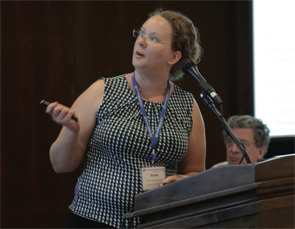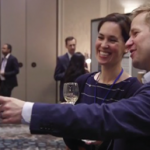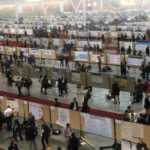
Practical Advice from Veterans
The veteran rheumatology researchers who were in Seattle to present their latest breakthroughs also had the opportunity to guide young minds interested in the field. The Foundation’s Investigators’ Meeting coincided with the ACR-hosted Rheumatology Research Workshop. The two events are held in conjunction with each other in order to help young scientists kickstart their careers. The workshop offered rheumatology fellows and junior faculty practical tips on applying for grants, job search and interviewing tactics, ways to nurture mentoring relationships and advice on recruiting research assistants. Young scientists also had the unique opportunity to get one-on-one advice from leading researchers at networking roundtables and practice their presentation skills in small workshops—without easels.
Young rheumatologists just starting their research careers gleaned valuable, practical advice from leading experts in the field at this year’s Rheumatology Research Workshop. Speakers used humor and straightforward tips to help fellows and others navigate the grant process and pursue their careers.
- In his keynote lecture, “Life, Liberty and the Pursuit of Research,” Stanley Pillemer, MD, emphasized the importance of mentors and encouraged the young rheumatologists in the audience to lean on their mentors as they build their careers. “Research is something you should consider to be happiness. It’s a wonderful opportunity to learn, explore and play,” Dr. Pillemer said. He spoke about the major strides made in rheumatology research during his career, which began when RA often left patients in wheelchairs. “In research, you’re climbing a cliff. You have to keep your wits about you and focus, focus, focus on what’s ahead, if you want to get to the top of the cliff on time.”
- In “Building Your Research Team,” the University of Colorado’s Steven M. Anderson, PhD, used an image of the popular ’80s TV show The A-Team to reflect why every research team needs doers, thinkers, funders, logistics experts, mentors, cheerleaders and collaborators. Although the lead researcher may be responsible for writing the grant, Dr. Anderson said, other team members may help create the project budget or a strategy for disposing of hazardous waste, the types of details that research grants require.
- As director of rheumatology at Columbia University, Joan Bathon, MD, offered young researchers tips on how National Institutes of Health study sections work. These important groups review grant applications for the bulk of American disease research. She urged the attendees to mine any knowledge they can from their mentors before applying for an NIH grant, and be careful and accurate with wording in their applications.
A Young Investigator’s Perspective
Jeffrey Sparks, MD, MMSc, a third-year rheumatology fellow at Brigham and Women’s Hospital in Boston, attended this year’s ACR Rheumatology Research Workshop on scholarship and shared his experience of the weekend:



